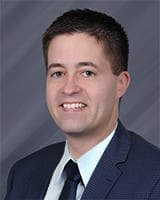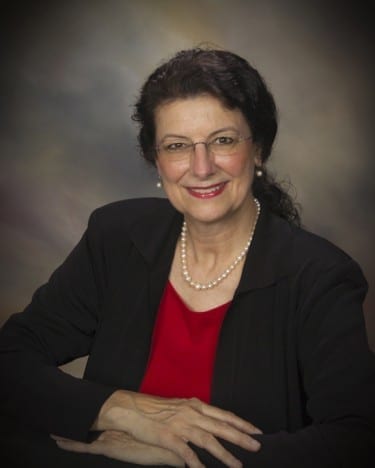Many of us are talking with colleagues and loved ones on screen these days due to the COVID-19 pandemic. That’s also been true about conversations that many health care providers are having with patients as a way to promote safe physical distancing. Eric Neverman, a 2012 graduate of DMU’s doctor of osteopathic medicine and master of health care administration degree programs, and his colleagues at the Grundy County, IA, Memorial Hospital (GCMH) mobilized quickly to offer patients “virtual” care.

“Our organization put forth a telemedicine platform in two weeks that otherwise would have taken two years,” says Dr. Neverman, D.O., M.H.A., FAAP, FACP, chief medical officer at GCMH and an internist and pediatrician at the UnityPoint Clinic in Grundy Center, IA. “This journey hasn’t been perfect, but we’ve been able to take great care of our patients.”
Alumna Jacqueline Stoken, D.O., PC, FAAPMR, FAOCPMR, DABHM, CIME, has been in private practice since 1999 but has largely been prevented from providing the hands-on osteopathic manual treatment that is a hallmark of her care. She’s been using Doxy.me, a safe, secure telemedicine software app, to communicate with her patients phone to phone, phone to computer and computer to computer. She also recently acquired a web camera to enhance videoconferencing capabilities with patients.

“I see patients in their homes, so they’re very comfortable,” she says. “I can visually check their range of motion, discuss any sensory changes they’re experiencing, describe exercises they can do and send them links to yoga and other exercise videos. Up to four people can be on a transmission, so I can bring in family members.”
Telehealth isn’t always ideal, of course. Both physicians note technical challenges can arise for older patients who may be less adept with technology and for rural patients whose Internet connection is slow. But those very patients can benefit by receiving care without having to travel. In addition, in March the Centers for Medicare and Medicaid Services (CMS) broadened access to Medicare telehealth services so that beneficiaries can receive a wider range of services from their doctors, and so doctors can be reimbursed for the services they provide.
“I’m hopeful virtual care will continue. It’s an opportunity as a physician to help design health care to take care of patients in the best way possible in the post-COVID-19 paradigm,” Dr. Neverman says. He participates in regional and system-level physician governance councils within UnityPoint and notes that these groups are already evaluating how to leverage new technologies to make health care more accessible and convenient for patients.
Personally, the two DMU grads are finding joys amid the pandemic. Dr. Stoken, an adjunct professor of rehabilitation medicine at DMU and a former member of the University’s Board of Trustees, was delighted that a Zoom meeting to celebrate her father’s 95th birthday brought together loved ones from several states and from as far as Croatia and the Czech Republic. She also reconnected with a couple of older patients who reached out to her in friendship.
Dr. Neverman, who recently joined the DMU Alumni Association Board, advised GCMH patients to follow safe health practices in a message on the hospital’s website. He also encouraged them to “become acquainted with our area state parks, county trails and nature areas,” and he shared hope that we make our way through the pandemic “slowly, carefully, patiently, and kindly.” He assured patients that GCMH staff have “gone to great lengths to cross-train our teams, ramp up infection control procedures, and practice donning PPE” to provide safe, effective care.
“I’m incredibly impressed with all my colleagues,” he says. “Every single person in our organization has been asked to go above and beyond their comfort zones, and everyone has because this is what we have to do. I’m so proud.”

